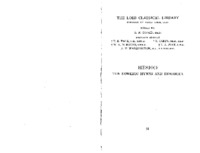Hesiod: The Homeric Hymns and Homerica (Loeb Classical Library #57)
Abstract
Hesiod (Hesiodus), an epic poet apparently of the eighth century BC, was born in Asia Minor but moved to Boeotia in central Greece. He was regarded by later Greeks as a contemporary of Homer. Three works survive under Hesiod's name: (1) "Works and Days," addressed to his brother. In it he gives us the allegories of the two Strifes, and the myth of Pandora; stresses that every man must work; describes the accepted Five Ages of the world; delivers moral advice; surveys in splendid style a year's work on a farm; gives precepts on navigation; and propounds lucky and unlucky days. (2) "Theogony," a religious work about the rise of the gods and the universe from Chaos to the triumph of Zeus, and about the progeny of Zeus and of goddesses in union with mortal men. (3) "The Shield" (not by Hesiod), an extract from a "Catalogue of Women," the subject being Alcmena and her son Heracles and his contest with Cycnus, with a description of Heracles' shield. All three works are of great literary interest.
Collections
- Libgen [81666]

